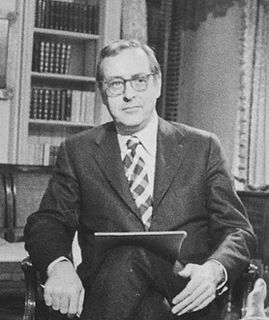A Quote by John Chancellor
The function of good journalism is to take information and add value to it.
Quote Topics
Related Quotes
Anyone who does investigative journalism is not in it for the money. Investigative journalism by nature is the most work intensive kind of journalism you can take on. That's why you see less and less investigative journalism at newspapers and magazines. No matter what you're paid for it, you put in so many man-hours it's one of the least lucrative aspects of journalism you can take on.
I'm a shareholder in Microsoft Corp. of some size, and while I don't work for the place anymore, I think a lot about that investment, how - as an outsider - might I add value or not add value? Do I believe that things are headed in a good direction? So I wouldn't say I spend the majority of my time on that, but I spend some time on that as well.
Intentional living is the bridge to significance. At the end of every year, I take time out to reflect and evaluate the events of the previous year - what went well and what needed improvement. From that inventory, I lay out my next year - how I intend to live, make the best use of time and maximize adding value to others. Success asks, 'How can I add value to myself?' Significance asks, 'How can I add value to others?' It is your intention that lends itself to significance.
Normally if you add information to information, you have more information. In case of my art, I destroy information, I would say, because the image is disturbed by the writings. In a way, they become pure imagery. For me it's really fun because it's an idealistic approach to images, to just play around with information and see what's happening.
Matt Drudge's role in the Monica Lewinski scandal] strikes me as a new and graphic power of the Internet to influence mainstream journalism. And I suspect that over the next couple of years that impact will grow to the point where it will damage journalism's ability to do its job professionally, to check out information before publication, to be mindful of the necessity to publish and broadcast reliable, substantiated information.
If an open source product gets good enough, we'll simply take it. So the great thing about open source is nobody owns it - a company like Oracle is free to take it for nothing, include it in our products and charge for support, and that's what we'll do. So it is not disruptive at all - you have to find places to add value. Once open source gets good enough, competing with it would be insane. We don't have to fight open source, we have to exploit open source.






























